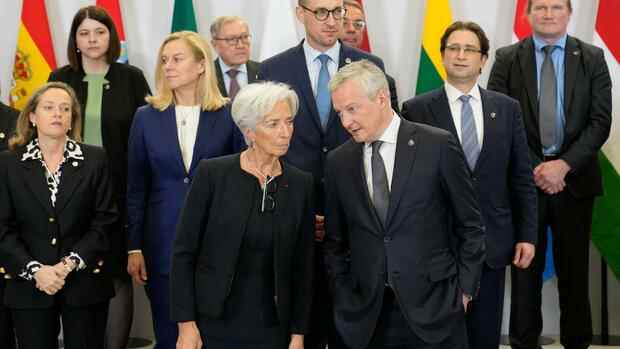Europe’s Finance Minister and ECB President Lagarde in Paris on Friday.
(Photo: dpa)
Paris The European Union could tighten its Russia sanctions – this may also include steps to exclude Russia from the international payment system Swift. France’s Finance Minister Bruno Le Maire said on the sidelines of a meeting with his EU colleagues in Paris on Friday that an agreement on the controversial issue between the member states could be reached “in the coming hours”.
In a joint statement, the EU finance ministers announced that the package of sanctions against Russia due to the war of aggression against Ukraine that had been decided the previous evening would be implemented immediately. “These sanctions will last as long as necessary and will be supplemented by further decisions,” the statement said.
The EU Commission and the European Central Bank (ECB) have been asked to “examine the consequences of further restricting Russian institutions’ access to the financial system”. And further: “All options are on the table.”
Commission Vice-President Valdis Dombrovskis said that the next steps against Russia are already being prepared. “Nothing should be taboo.” A new round of sanctions would also target Belarus, which is an ally of Russia.
Top jobs of the day
Find the best jobs now and
be notified by email.
Some EU member states had previously slowed down the Swift exclusion, including Germany and Italy. Le Maire said a “group of countries” are reluctant to completely cut Russia off from the financial system. “France does not belong to this group,” he clarified.
One of the tasks of the French EU Council Presidency, however, is to create unity on the subject. “Swift is the nuclear weapon in the financial markets,” said the minister. Use of this weapon must be carefully considered.
Lindner: Germany is not isolated
Federal Finance Minister Christian Lindner (FDP) said in his press conference in Paris that he could not confirm that Germany was isolated or criticized on the Swift issue. The federal government is open to this step.
However, it is also “legitimate” to ask questions about the consequences, especially with regard to the effects on Russian gas supplies to Europe. Therefore, a “technical examination” of the possible consequences was commissioned by the Commission. The European sanctions would also ensure that “only isolated transactions” with Russian financial institutions are possible.
Also read about the Ukraine war:
In addition to the financial sector, the punitive measures decided on Thursday evening by the EU heads of state and government are also intended to weaken key Russian industries via export controls for high-tech products. In the transport sector, the main concern is to cut off the supply of spare parts and other technology to the Russian aviation industry. Also targeted are the travel opportunities and assets of business people and government officials.
The program of the EU finance ministers’ meeting had been changed at short notice and shortened to one day because of the Russian attack on Ukraine. The focus was now on the implementation of the sanctions and the effects on the European economy, especially in the energy sector.
“The unity of European countries and the strength of our European economy will enable us to cushion the impact of this crisis,” the joint statement said. “We will take the appropriate steps to limit the impact on our citizens and businesses.”
ECB warns of the consequences
The ECB expects inflation to continue to rise because of the crisis, as central bank chief Christine Lagarde said. “The ECB stands ready to take any necessary steps to ensure price stability and financial stability in the euro zone,” said Lagarde, who also attended the Paris meeting.
The ECB will carry out a “comprehensive assessment” of the possible consequences of the Russian attack on Ukraine and European sanctions with a view to the next Council meeting on March 10. Rising energy prices and economic uncertainty are the two biggest potential brakes on consumer spending, investment and thus growth, Lagarde said.
However, it is still too early to foresee the economic consequences. This also applies to speculation about whether the ECB will have to postpone an interest rate turnaround.
“The Russia sanctions will also have an effect on the European economy,” said Dombrovskis. The first assessments from the Commission would indicate that growth in the EU would be weaker, but would not be stopped. Before the crisis, Brussels had expected economic growth in Europe of four percent this year.
More: EU wants to freeze Putin and Lavrov’s private assets
